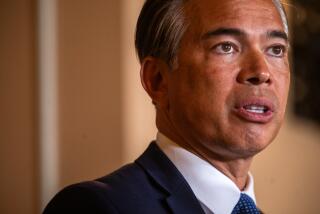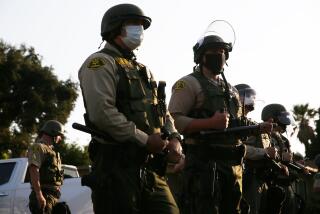Sheriff’s New Tactic on Shooting: Contrition
- Share via
When the grainy videotape of deputies peppering a Compton neighborhood with 120 bullets began making the rounds of national news, local community activists wasted no time calling in their big guns.
The Rev. Al Sharpton’s phone began ringing in New York on Tuesday afternoon, the day after the May 9 shooting that wounded a Los Angeles County sheriff’s deputy and the driver of a cornered SUV and shattered windows and walls of homes.
By Wednesday, the renowned law enforcement critic was in Los Angeles, calling the barrage “the shootout at the OK Corral.” Activist circles buzzed with rumors that the Rev. Jesse Jackson would be coming to town.
Los Angeles County seemed poised once again to stand in the eyes of the nation as the epicenter of police brutality.
But county Sheriff Lee Baca had been making his rounds too. By noon Monday, less than 12 hours after the shooting, he had offered this blunt critique: “I know there were too many shots fired. I don’t need an investigation to tell me that.”
By 3 a.m. Tuesday, Baca was dressed and ready for appearances on “Good Morning America,” the “Today” show and news programs on Fox News, CNN and MSNBC. For the next 90 minutes, he was live on national TV promising a thorough review of the shooting, which followed an early morning, low-speed chase through residential streets.
The next afternoon, Baca began walking door to door in Compton, tallying bullet holes and offering apologies. Sharpton met up with him there.
That night, the sheriff took the stage at a town hall meeting offering residents compensation for homes damaged in the shooting spree.
Taking a cue from their leader, the deputies involved offered a striking public apology Friday.
By Saturday morning, while activists were busy urging residents to turn out for a Monday rally, Baca had managed to deflect community anger and keep agitators at bay. He did it by borrowing a page from activists’ own handbook -- denouncing the shootings, ordering an inquiry and meeting with residents to, as he says, “absorb their pain.”
The shooting involved 10 deputies trying to stop the unarmed driver of an SUV. The investigation may not be complete for weeks, but one thing has become clear: Baca’s response represents a new approach to handling the fallout from controversial shootings. And it has left community activists scrambling to compete.
They had expected stonewalling, denials, delay. Instead they got a contrite sheriff and a multiracial corps of apologetic deputies, who stood somberly before news cameras while their attorney conveyed “their unqualified and sincere apology to those who ... were affected by the shooting.”
Although they stopped short of saying that their tactics toward a man they had believed to be armed and dangerous were wrong, the symbolism proved compelling.
Then Jackson, who had arrived in Los Angeles that weekend, called the shooting a hate crime and an act of terrorism.
Local activists were forced back on their heels, caught between the fiery rhetoric of Jackson and Sharpton and the evolving reality on the streets: Only a handful of people showed up at what was supposed to be a protest Monday morning.
Najee Ali of Project Islamic HOPE contemplated what to say to the lone news camera.
“How would it look for us to be up there now slamming these deputies,” he said as he stood on a sidewalk outside Compton City Hall, considering whether he should instead criticize Jackson.
When the camera rolled, Ali was on cue. “An apology is not enough,” he said. “We’re outraged and will continue to be.”
Privately, he had already conceded that in the court of public opinion, Baca had probably scored a victory.
Jackson’s “hate crime” characterization seemed out of sync with reality. Of the 10 deputies who fired weapons, three were black, four Latino and three white.
By that afternoon, Ali had split ranks with Jackson. The civil rights leader’s comments were, he said, “inflammatory, counterproductive and false.”
“He’ll say this stuff, then go on back to Chicago, and we’re left here to try to work with these officers,” Ali complained later.
Indeed, within days, Jackson and Sharpton were gone, headed for Mexico to meet with President Vicente Fox over remarks he had made about blacks that were considered disparaging.
And the Compton shooting, which had been videotaped by a freelance cameraman and replayed for days on the national news, began fading from public consciousness.
The incident started after deputies, responding to a call that shots had been fired in the area, approached a vehicle that resembled the one involved in the incident. The SUV they approached was driven by Winston Eugene Hayes, 44. After a slow pursuit, deputies began firing when they cornered the SUV and it backed toward them.
In the televised scene, the residential Compton street resembled a war zone. Sharpton called the display of police firepower the most reckless he had ever seen.
“Police were shooting up the neighborhood like it was the wild, wild West,” he said.
Law enforcement officials say the deputies might have panicked and responded to the initial gunfire volley with so-called contagious fire, resulting in a flurry of wild shots.
Community leaders are far from being of one mind about the sheriff’s sensitivity effort. Is this payoff from years of activism, or just law enforcement finally learning the value of timely spin?
“There’s a reason why Baca has shown leadership,” Ali said. “He’s shown leadership because of our efforts organizing against police brutality. We feel those years of work have led us to a major victory: the [deputies’] unprecedented apology. That’s never happened in the history of law enforcement here.”
Even tough-talking Los Angeles Police Chief William J. Bratton, who once called Ali a “nitwit,” shows signs of softening his rhetoric. He has apologized for characterizing gang members as thugs and terrorists, and he declared his officers’ flashlight beating of a car thief suspect last year “a mess” that warranted discipline.
Skeptics suspect that the touchy-feely approach will be window dressing if policies don’t change.
“Bratton and Baca as soft-sell PR persons are almost like firemen having to douse the flames and show their departments’ good face to the community,” said commentator Earl Ofari Hutchinson. “But when these things keep happening, after a while people see through that approach. You cannot just placate and pacify people.”
Residents of the block where the shooting occurred say they are not mollified by mea culpas.
“It didn’t make me feel better,” said Terry Moore, who witnessed the shootings, along with her sister, daughter and niece. “They need to be retrained, to learn how to shoot.
“I’m not against them,” she said. “I know I live in a neighborhood where I may have to pick up this phone and call them at any given time. I just don’t like the way they came in here and shot up the neighborhood. I would never want that to happen again.”
Even Baca’s natural adversaries credit him for using his long history of community involvement and political sophistication to forge alliances in volatile cases.
“Some people would say he is saving face, doing this to cover what happened. But I think it’s more a sensitivity, an understanding that he has to listen to the community,” said the Rev. Kerry Allison, whose phone call helped bring Sharpton to Los Angeles. “He has good people around him who give him good advice. That keeps him a step ahead of most people.”
When Sharpton solicited a meeting with Baca, the sheriff invited the civil rights leader to join him on a walk through Compton.
“I happen to be a big admirer of the Rev. Sharpton -- with all his flaws. He is a voice for justice,” Baca said later. The two surveyed the shooting scene like allies -- the bellowing, fiery Harlem minister alongside the soft-spoken, slender career cop.
The sheriff “came up and said he was sorry for everything, that there was no cause for a lot of this,” said resident Moore. Even before Baca’s visit, her block was swarming with deputies “asking us how we feel, what did we feel, are we all right,” she said. “I know they were just trying to come over here and make everybody feel good.”
And a few days later, two of the deputies involved in the shooting showed up unannounced to talk with residents.
Both Baca and Bratton understand the importance of public relations and community outreach, says Joseph D. McNamara, a fellow at Stanford University’s Hoover Institution and former San Jose police chief.
Former LAPD Chief Daryl Gates and the former, since deceased, L.A. County Sheriff Sherman Block “would stonewall whenever there was a crisis,” McNamara said. “Bratton and Baca know the secret to surviving these crises is to have already established a relationship with the community.... People don’t want double-talk. You need to get in front of the cameras and tell what happened.”
For Baca, that meant facing a verbal pounding from frustrated residents in a Compton town hall. He absorbed it, telling the assembly, “we’re not here to twist it, we’re not here to sugarcoat anything, we’re here to tell it exactly like it is -- the good, the bad and the ugly.”
When he finished, longtime resident Mollie Bell, 58, thanked Baca for “stepping up to the plate.”
Times staff writer Andrew Blankstein contributed to this report.
More to Read
Sign up for Essential California
The most important California stories and recommendations in your inbox every morning.
You may occasionally receive promotional content from the Los Angeles Times.













